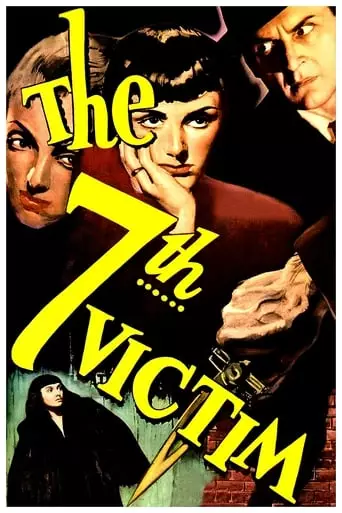
The Seventh Victim (1943) Watch Online Free
A woman in search of her missing sister uncovers a Satanic cult in New York’s Greenwich Village and finds that they could have something to do with her sibling’s random disappearance.
The Seventh Victim is a 1943 horror film directed by Mark Robson and produced by Val Lewton. The narrative follows Mary Gibson (played by Kim Hunter), a young woman who arrives in New York City in search of her missing sister, Jacqueline (Jean Brooks). Mary’s quest leads her to uncover a sinister underworld involving a Satanic cult known as the Palladists, who are connected to her sister’s disappearance. As Mary delves deeper into this dark realm, she encounters various characters, including Dr. Judd (Tom Conway), a psychiatrist with his own hidden motives, and Frances (Isabel Jewell), a member of the cult. The film culminates in a tragic and haunting conclusion, highlighting themes of existential despair and the search for meaning in a seemingly indifferent world.
Nihilism and Existential Despair
At its core, The Seventh Victim explores the concept of nihilism—the belief that life lacks inherent meaning. Jacqueline’s character embodies this philosophy, grappling with feelings of emptiness and the search for purpose. Her existential struggles are portrayed through her interactions with the cult and her ultimate fate, reflecting the film’s bleak outlook on life.
Homoerotic Undertones
The film subtly incorporates themes of homoeroticism, particularly through Jacqueline’s relationships with other female characters. Critics have noted the film’s exploration of these themes, especially in the context of the Palladist cult and its members. This nuanced portrayal adds depth to the characters and their motivations, offering a complex view of human relationships.
Psychological Horror
The Seventh Victim delves into psychological horror, focusing on the internal struggles of its characters rather than external threats. The film examines the fragility of the human psyche, the impact of mental illness, and the haunting effects of past traumas. This introspective approach to horror sets it apart from more traditional genre films of its time.
Upon its release, The Seventh Victim received mixed reviews. Some critics praised its atmospheric tension and innovative storytelling, while others criticized its complex narrative and pacing. Over time, however, the film has gained recognition as a classic in the horror genre, influencing subsequent filmmakers and being cited for its unique blend of horror and psychological drama.
After viewing The Seventh Victim, you may experience a lingering sense of unease and introspection. The film’s exploration of existential themes and psychological horror can evoke deep contemplation about the nature of life and death. The haunting atmosphere and tragic conclusion may leave you reflecting on the characters’ fates and the film’s broader philosophical questions. This emotional resonance is a testament to the film’s enduring impact and its ability to provoke thought long after the credits roll.
